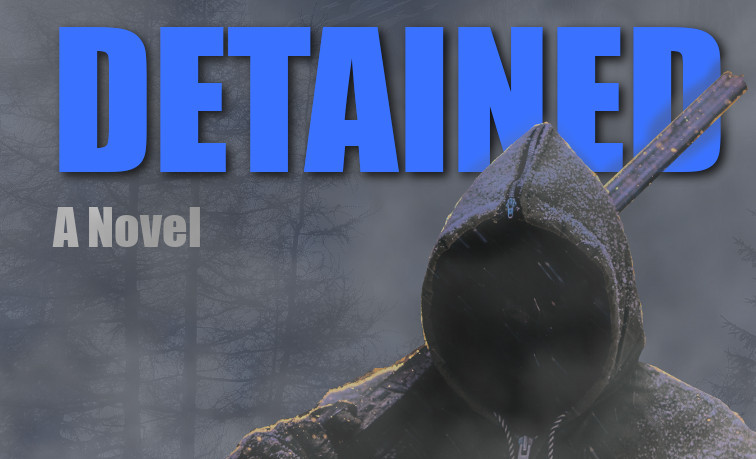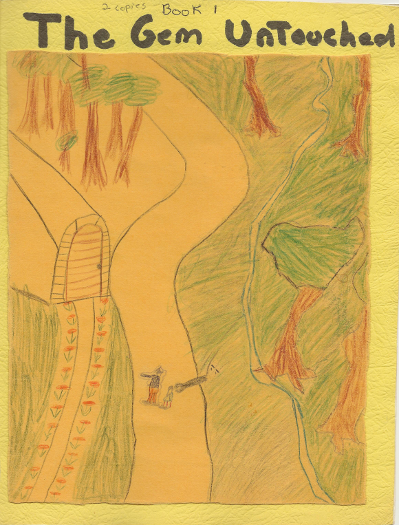I’ll be posting one chapter of my novel Detained every week throughout 2021. Download links below!
5. Candace
He came to save her from the Most Boring Mole Ever and she was eternally grateful. The guy—Andy, if that was his real name—seemed nice enough, although his eyes went and lingered places on her anatomy she didn’t appreciate. She had a sense that he was the sort of young kid who got a little drunk and made passes at waitresses like her, then grinned and was sorry-not-sorry when he got called out on his shit. He was also, she thought, the sort of guy who thought he was a lot more charming than he really was, as he seemed instantly convinced she was really into him.
She kept a smile on her face. She’d been through this a million times: Tourist hunters in town for a night or three, mistaking her professional politeness for attraction. She had a collection of matchbooks, business cards, napkins, and other trash with phone numbers. She didn’t know why she kept them.
“Jack says there’ll be sandwiches,” Mike said, suddenly appearing next to her. “Couple of minutes.”
“Thank god,” Andy said, smiling. “And beer, I hope.”
She thought his smile was good, but calculated. She was trying to watch him like a disinterested observer. To judge his performance, and she thought it was good—if she’d hadn’t remembered checking the bathroom earlier in the evening, if the place hadn’t been so empty, making it easy for her to note the sudden appearance of an unfamiliar face—she might have been fooled. Mad One Jack’s never got crowded in the way she saw bars on TV get crowded, but there were a few nights every week when there were a couple dozen folks moving through the place, mostly travelers stopping off for a beer and a bite. The town was ten miles east and population less than a hundred, so off-season the bar was usually pretty dead.
Did Hammond decide on the mole strategy without knowing the situation? If she’d known how empty the bar was, she would never have imagined the ploy would work. She thought that indicated the Colonel and her crew, whatever they were, had put this operation together quickly.
“Do me a favor,” Mike said to Andy. “Check on Jack in the kitchen, see if he needs any help?”
She admired the dim smile Mike put on his face, looking for all the world like an idiot. Andy nodded.
“Sure,” he said, and walked off.
She watched that dumb smile fade. “Who are you?” she asked, and was immediately embarrassed.
He smiled. “Thanks for the distraction. I know it was kind of a shitty, sexist thing for me to say, but I honestly didn’t have a better idea.”
She shrugged. “I’ll take it as a compliment. I always used to tell my Dad my job was hot waitress.” She bit off the second part of that sentence: Wishing he was still around for her to gloat about being right.
He smiled, then leaned in and filled her in on the plan, such as it was. She liked the way he smelled. He wasn’t wearing any sort of cologne, it was just him: Sweat and something else, something sexy and interesting.
“The best thing to do with a spy,” he said in a low, intimate voice, “isn’t to stonewall. Spies get suspicious when they’re not hearing anything. The best thing to do is to feed them something totally useless, but busy.”
She nodded. “Sandwiches.”
He grinned. “Yup, we all just had a big, serious discussion about sandwiches.”
“That was smart. Where’d you learn to think like that?”
He shrugged. “I’ve been … I guess the best word is studying. I’ve been taking classes with people. Experts. Anyone with a skill or a point of view. I travel to them, spend some time with them, try to learn something new. Sometimes it’s a waste of time. Sometimes it’s just fun. Sometimes I learn something really amazing.”
She raised an eyebrow, thinking this was the weirdest thing she’d ever heard … but kind of cool, too. “So you’re just traveling around with your black no-limit credit card, studying the world.”
He laughed, face reddening, and she liked that he was awkward about it. “I, er, came into some money. All right: A lot of money. I was really young and my parents were both dead.”
“I’m sorry,” she said, worried that she’d put her foot in it.
He waved her off. “It was a long time ago—now. Back then, I was sixteen when Mom passed and it was ugly. Anyway, my grandfather on Mom’s side was rich, like, epically rich, and he’d always intended to leave everything to me because he hated my father. So when he passed away, I inherited … well, a lot of money and I was twenty years old.”
“Jesus.” She tried to imagine herself suddenly wealthy at twenty. What would she have done? Given Dad the retirement he deserved, certainly. Would she have gone to school, become an artist? She thought so, but twenty seemed so long ago, like a different country.
He was looking around, watching. She was amazed at how easily he’d taken charge, someone none of them had met before, someone none of them knew. She trusted him, though. Something about him seemed reliable, real. Like he was a what-you-see-is-what-you-get sort of guy.
“Anyway, I wasn’t ready for it. I spent ten years partying. Like, seriously partying. Heavy stuff. I should have died a bunch of times. I built up this group of … well, I called them friends but they were just leeches and enablers, really. Had a ball, for a while. Met a … ” he hesitated, looking down at his shoes for just a moment, but she thought it looked incredibly sad. “Met a girl,” he finished quietly. “She was messed up, like me, but we loved each other.” He suddenly looked up at her, directly into her eyes. “She died. And it was my fault. I mean, I didn’t kill her or anything, but it was the way we lived, the way I lived. I loved her, but I loved the party more, and so she died.”
Without realizing it, she’d reached out and put her hand on his arm. The pain in his face was real.
“Anyway,” he said, clearing his throat and smiling. “I sobered up after that. Checked in with my finance guy, and was surprised to learn I was still pretty rich, though I’d blown a huge amount of it. I was thirty-something and I’d spent most of my youth in a haze, and I realized somehow I’d felt sorry for myself because my parents had been taken from me. I felt like an idiot, suddenly, and so I decided I needed to clear my head. I needed to grieve for Julia, I needed to do something, learn something, broaden my horizons. So that’s what I’ve been doing for a year and a half now.” He looked around again. “I’m sorry. I didn’t mean to just dump all that. It just came out. What about you? What’s your story?”
She tried to put an expression of self-mockery on her face. “Oh, you know: Just a small town girl, living in a lonely—actually, you can’t even call this a small town, we’re like fifty people living in the woods with a road and a post office—”
“Yeah, I passed through town—what is it, population seventy, there’s a feed store and a diner.”
She nodded. “Yup. So, micro-town girl thinks she’s going to be an artist. Wins an award in junior year of high school, but forgets that her graduating class is twenty kids, so the competition ain’t so hot. She figures she’ll take a job waitressing at Mad One’s because that’s what her mama did and that’s just what girls do around here, but she’ll do it for one year and save up and head out for New York City to attend art school.”
He smiled. “So far so good. What happened?”
She smiled back. “You mean, why is that girl still waitressing here instead of opening a gallery show in SoHo or at least married to some rich tourist who came through laying all the local waitresses?”
His smile kinked up. “Aside from the fact that I’d never use a word like laying, yeah, pretty much.”
She shrugged. “Well, Dad got sick. I stuck around to take care of him. His retirement dried up, and I started working extra shifts to pay bills, and when he died there was debt. Just nothing but debt. And I’ve just about cleaned it up, and was making plans to finally do something, take off, when this happens.”
“About to make a break for it, literally soldiers show up to stop you,” he said, sounding amused.
“Yes! Exactly! Not to sound all self-important, but it’s like the universe doesn’t want me to leave.”
“Maybe so you could meet me.”
She could tell, the moment he said it he wished he hadn’t, and an awkward moment welled up between them. She’d never felt this comfortable with someone this quickly, and he wasn’t even trying. She’d seen guys try. She’d seen them try so damn hard, and this was the opposite.
Suddenly there was a commotion, and they both spun to see the tourist, Simms, standing near the front door, looking agitated.
“You can’t just hold us here without some sort of authority!” he was saying, sounding more exasperated than afraid. Two soldiers stood in front of him, impassive. Nearby, the nerdy-looking man with the glasses took no notice, working on his laptops. “Jesus, we’re American citizens and this is native soil. You haven’t shown us any sort of authorization. I think you’re just trying to intimidate us.”
Glen Eastman started towards him. “Mr. Simms,” he said in the sonorous voice Candace remembered so well from her school days, being ordered to do laps, “step back here and let’s talk about this.”
“Dude,” Jimmy Haggen said drunkenly from behind the bar, where he’d set himself up as the unofficial bartender. “Let the tourist go if he wants to go!”
Simms waved a hand impatiently behind him. “I’m walking out this door. Anyone puts a hand on me, they’re going to be hearing from my lawyer.”
“Right on!” Haggen cheered, enjoying himself. Candace felt a wave of revulsion. It had been nearly two decades, but she still couldn’t believe she’d dated him.
Suddenly, the man in the glasses spoke. His voice was high-pitched and breathy. “Mr. Simms, no one will lay a hand on you.” He turned around in his seat and stared at the balding man with a blank, flat expression. “We will shoot you if you try to walk out that door. Do you understand?”
Simms turned and looked back at the other detainees for a moment, his expression uncertain. Then he set his mouth firmly and turned back. “I’m going out that door, and you have no right to stop me, mister.”
The man in the glasses nodded. He gestured, and one of the two soldiers unsnapped his holster and drew his weapon, a black automatic pistol. He held it down by his thigh, his finger along the side instead of on the trigger, but Candace still jumped at the sight of it, adrenaline dumping into her veins. She was used to guns; she’d grown up with them and had been on more hunting trips than she could remember, but there was something about a handgun that was somehow more threatening than a hunting rifle.
“Kevin,” Mike said. “Come on, buddy, they’re serious. Step back and let Mr. Haggen pour you a drink.”
“Fuck that!” Jimmy shouted. “Stand up, Kev! Show ?em who’s boss!”
“Jimmy, shut up!” Candace hissed.
Simms hesitated, and half turned back, shaking his head. Candace felt herself relax. Then, suddenly, he pushed aside one soldier and made a run for the door.
Everything happened in a blur. She saw Mike take a step forward instinctively. She heard Glen shout something. Her whole body tensed up, and she watched the second soldier raise his sidearm just as Simms pushed past him. She heard the shot, louder than she would have thought possible in the stillness of the bar. She saw Simms flail backwards as if he’d been shoved by some invisible giant.
Someone was screaming. It took a moment to realize it was her.
EPUB | MOBI | PDF






